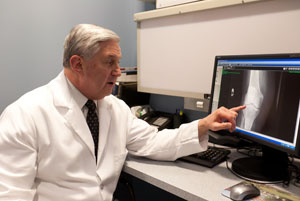- Locations
- Find a Physician
- By Physician
- By Department
- The Center for Spine Health
- Hand & Wrist Center
- Shoulder & Elbow Center
- Foot & Ankle Center
- Joint Replacement Center
- The Sports Medicine Center
- Pediatric Orthopedic Center
- Trauma & Fracture Center
- Osteoporosis and Bone Health
- Oncology Center
- Cartilage Repair Center
- Concussion Rehab Center
- OrthoDirect
- Careers
- Patient Portal
- Intranet
 The era of the super-specialist
The era of the super-specialist
There are tremendous advances taking place in medicine today, but in order to benefit from them, the healthcare consumer must take an active role. The best healthcare will not find you; you have to seek it out.
While the United States offers the highest standard of healthcare in the world, there is still huge treatment variation based on the doctor you see. Bottom line, the doctor you choose will determine the quality of care you will receive. Here is an overview of how to navigate through the healthcare system to find the best doctor for you.
First, the healthcare consumer needs to understand that today’s medical field is divided into very narrow specialty categories. Twenty years ago, the specialty of orthopedic surgery addressed a variety of problems including knee, foot, hip, shoulder, hand and spine. While an orthopedic surgeon in a small rural town may still address all these problems, most orthopedic surgeons today in larger cities specialize in only one of those areas. Therefore, the educated healthcare consumer with a knee problem should seek out an orthopedic surgeon who only works on knees. This increases the likelihood that the surgeon will be more proficient in surgery and will use the most advanced surgical techniques available for knees.
Spine specialists can include neurosurgeons specialized in spine surgery, orthopedic surgeons specialized in spine surgery, physical medicine doctors, anesthesiologists and physical therapists who specialize in the nonsurgical relief of back and neck pain symptoms.
As with anything in life, practice makes perfect. All clinical outcome studies confirm that the more times a surgeon performs a procedure, the better they become at it. Consequently, spine surgeons who perform more than 150 surgeries per year will be more proficient than those who perform 50 each year.
A second indicator of quality is training and experience of the physician. One might believe that a younger physician a few years out of training might be at a disadvantage compared to a surgeon who has practiced for 25 years or more. However, this is not an accurate generalization. In reality, an older physician may be more comfortable using traditional techniques, while a younger, fellowship-trained physician may be trained in the most modern, minimally invasive techniques and instrumentation. Age is not necessarily a good indicator of quality.
About using your health insurance plan as a guide
Most people are surprised to learn that their health insurance provides little help in finding the best specialist within a specific niche. Offering a preferred provider directory of specialists gives no real indicator of quality. Inclusion in a PPO directory typically only means that the physician has agreed to accept a discounted rate for payment from the insurance company. In this sense, “preferred provider” simply means that the insurance company would “prefer” you to see doctors who have agreed to accept a discount. These discounts can be steep, depending upon the health insurance plan. With mature industries, consumers expect to pay more for higher quality. For example, Lexus and Mercedes Benz are not the same price as Ford or Chevrolet.
Unlike other industries, in which market demand and the highest quality product commands the highest price, healthcare is an industry that is woefully behind the times. But that is changing.
A growing trend nationwide is that super-specialists, who are in the highest demand by virtue of reputation and outcomes, can be less motivated to accept discounted reimbursement from some health plans. These super-specialists typically have full schedules and don’t need to discount their services to attract patients. Consequently, they are opting not to be included in a PPO panel, while other physicians may have to rely on discounting to attract patients.
Most PPO plans have out-of-network benefits that enable patients to see a physician who is not listed in the PPO directory. Typically, the person may have to pay a larger percent of the bill and a larger deductible. But for complex problems, this still may be the more prudent approach in the long run to access the most current technology and the specialist with the least invasive treatment alternatives. More to the point, in some cases a spine center of excellence may actually tell you that you do not need to have a surgery at all — which can save the consumer money as well as the risks and pain of an unnecessary surgery.
More and more employers are recognizing that traditional healthcare plans have historically done a poor job of establishing panels of physicians based on quality care. Consequently, several employers are seeking out centers of excellence for the treatment of complex problems like cancer, heart disease, neuroscience, organ transplants, joint implants and spine problems. It is clear that the healthcare insurance industry is in great transition having to adapt to the demands of the patient who is the most overlooked person in the equation. But it will take time.
The business of being a super-specialist
Part of the problem related to PPO panel discounting is that it penalizes top super-specialists who invest in the most advanced and expensive technology for their offices, highly trained physician assistants and a modern clinic facility with multiple capabilities under one roof for patient convenience. By being on a PPO panel, a super-specialist who has invested additional years in training, fellowships and advanced, continuing education courses in the latest procedures must accept the same level of payment as a generalist who has not similarly invested in training, support staff and clinic facilities.
In this sense, health insurance plans are not able to steer consumers to the highest quality physicians. They are in a difficult position because they find themselves somewhat handcuffed and unable to direct consumers to the highest quality physicians. On one hand, every healthcare plan medical director knows that the best physicians and super-specialists will save money as their outcomes are better and they provide minimally invasive surgery options that are less risky. These directors are trying to determine ways to subtly encourage patients to seek out centers of excellence for complex problems. However, they are also concerned with possible litigation from other physicians that may develop if they overtly favor one center over other physicians.
Under this current scenario, healthcare consumers are left on their own to search for a top healthcare provider. It is their responsibility to research the best center of excellence for treatment of a complex health problem.
How to find a super-specialist
There are many ways to identify the best specialist within a given area. One place to start is to consult a family practice doctor who addresses your general healthcare needs. This “primary care” doctor will usually know the best super-specialists within a specific region. Also, since this primary care physician may have referred patients to that specialist before, they may have seen firsthand their clinical outcomes after surgery. If these outcomes are poor, the primary doctor will not refer additional patients.
On the downside, this referral process abdicates the selection process to someone else. Also, some physicians refer to other physicians out of habit, or in the hope of reciprocal referrals back. The educated healthcare consumer would do well to perform secondary research to identify the best possible specialists and clinics within a given specialty.
The Internet can provide a wealth of helpful information. The educated consumer can locate information on a doctor’s education, training, clinic and area of specialization.
Cues on physician competence
Fellowship-training, the highest level of orthopedic medical training in the United States, can be an indicator that the physician has invested an additional year in a specific area of specialization. Note where the physician has trained. Training at a large or prestigious institution would expose the physician to more complex cases, which in turn makes them more proficient in their chosen specialty.
Board certification is another criteria that indicates a physician has met the competency standards within an area of specialization, as judged by the specialty board. Board certification typically requires that a physician has been in practice for several years since graduating from medical school and has passed a rigorous written and oral exam. Younger physicians, however, may be in the process of obtaining board certification by fulfilling the various criteria of time in practice, etc. These physicians are called "board eligible."
Using the Internet for information
When looking at a physician’s own Internet site, determine if the physician takes a multidisciplinary approach to his specialty. Typically, the best specialists will place a variety of complementary services under one roof for the convenience of the patient. This center of excellence approach can involve having therapists who are specialized in a particular niche as well as an internal diagnostic center with X-ray, MRI and treatment suites, so that patients don’t need to drive around town for various diagnostic studies or treatments.
Complement this search within individual Internet sites with a review of reputable national sites that provide overall information about a specialty. These sites will list all the various treatment options for a given problem. Then compare this impartial, unbiased list with the recommendations provided by a specific clinic’s Internet site.
Beware of sites that appear to be informational but are, in fact, steerage devices for physicians who pay the site to be listed as “preferred providers.” There are thousands of scam Internet sites out there that list doctors who pay a fee to be listed as "an expert" in a specialty. Typically, the only impartial sites are those related to the specialty boards of the American Medical Association such as the American Academy of Orthopedic Surgeons (AAOS) or the American Academy of Neurological Surgeons (AANS). The societies responsible for board certification usually provide a nonbiased listing of the board-certified physicians in your area.
Get a second opinion
Most health insurance plans advise or require that the healthcare consumer receive a second opinion when treatment involves a complex surgical procedure. This is excellent advice. Furthermore, the healthcare consumer should not inform the second provider that their visit relates to a second opinion, since some physicians are reluctant to provide conflicting opinions. If you have received two identical, unbiased opinions related to your diagnosis and recommended treatment, you can proceed accordingly with more confidence that you are pursuing the right approach.
If the two opinions disagree, you should examine the training and qualifications behind each opinion to determine which is most likely the correct recommendation. Another option is to pursue a third opinion, but this can add to your confusion.
Be willing to travel
The trend in medicine is that the best specialists are creating Centers of Excellence that focus on certain problems like cancer, neuroscience, spine problems, diabetes, asthma, etc. Because the cost of developing these centers is high, they typically exist only in larger cities. Consequently, if you need complex medical care, be prepared to travel.
The physician visit
The best specialists within a given niche will typically provide all the appropriate nonsurgical and surgical treatment options for your problem, along with the pros and cons of each approach. In some cases, treatment may include watchful waiting. If your doctor is unwilling to answer questions about your diagnosis or treatment, you’re in the wrong place. Go find another doctor.
Be a good patient
After all the searching, if you have found a good doctor, the rest is in your hands. To be a good patient, you must comply with the physician’s recommendations and prescriptions. Too many times, it’s natural to want a magic pill or miracle surgery to provide an easy route back to activity. However, you should always view surgery as the last card to be played, after all nonsurgical options are explored.
For nonsurgical treatment alternatives to work, the patient must often follow physician and therapist prescriptions, which may include a commitment to therapy. For spine and joint problems, this may mean incorporating special strengthening exercises that rebuild supporting muscles, so that surgery is not necessary. While athletes are familiar with the required commitment and pain associated with the exercise gym, others may not. It can be new territory for many people, but it is essential if you are to give nonsurgical options a chance to work.








